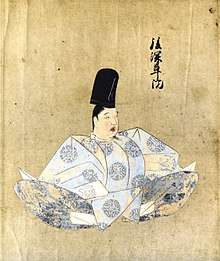1304
Year 1304 (MCCCIV) was a leap year starting on Wednesday (link will display the full calendar) of the Julian calendar.
| Millennium: | 2nd millennium |
|---|---|
| Centuries: | |
| Decades: | |
| Years: |
| 1304 by topic |
|---|
| Leaders |
|
| Birth and death categories |
| Births – Deaths |
| Establishments and disestablishments categories |
| Establishments – Disestablishments |
| Art and literature |
| 1304 in poetry |
| Gregorian calendar | 1304 MCCCIV |
| Ab urbe condita | 2057 |
| Armenian calendar | 753 ԹՎ ՉԾԳ |
| Assyrian calendar | 6054 |
| Balinese saka calendar | 1225–1226 |
| Bengali calendar | 711 |
| Berber calendar | 2254 |
| English Regnal year | 32 Edw. 1 – 33 Edw. 1 |
| Buddhist calendar | 1848 |
| Burmese calendar | 666 |
| Byzantine calendar | 6812–6813 |
| Chinese calendar | 癸卯年 (Water Rabbit) 4000 or 3940 — to — 甲辰年 (Wood Dragon) 4001 or 3941 |
| Coptic calendar | 1020–1021 |
| Discordian calendar | 2470 |
| Ethiopian calendar | 1296–1297 |
| Hebrew calendar | 5064–5065 |
| Hindu calendars | |
| - Vikram Samvat | 1360–1361 |
| - Shaka Samvat | 1225–1226 |
| - Kali Yuga | 4404–4405 |
| Holocene calendar | 11304 |
| Igbo calendar | 304–305 |
| Iranian calendar | 682–683 |
| Islamic calendar | 703–704 |
| Japanese calendar | Kagen 2 (嘉元2年) |
| Javanese calendar | 1215–1216 |
| Julian calendar | 1304 MCCCIV |
| Korean calendar | 3637 |
| Minguo calendar | 608 before ROC 民前608年 |
| Nanakshahi calendar | −164 |
| Thai solar calendar | 1846–1847 |
| Tibetan calendar | 阴水兔年 (female Water-Rabbit) 1430 or 1049 or 277 — to — 阳木龙年 (male Wood-Dragon) 1431 or 1050 or 278 |
| Wikimedia Commons has media related to 1304. |
Events
January–December
- February 9 – Wars of Scottish Independence: John "Red" Comyn, Lord of Badenoch, negotiates a peace with the Kingdom of England.[1]
- July 20 – Fall of Stirling Castle: Edward I of England takes the last rebel stronghold in the Wars of Scottish Independence.
- August 17 – The Battle of Mons-en-Pévèle is fought to a draw, between the French army and the Flemish militias.
- October 24 – Sasa Bey of the Beylik of Menteşe conquers Ephesus from the Eastern Roman Empire, massacring and deporting its native population.[2]
Date unknown
- James II of Aragon reconquers Villena, Spain.
- Holland and Zeeland are occupied by John II, Duke of Brabant and Guy of Dampierre. John II, Count of Hainaut recovers the counties.
- Ala-ud-din Khalji, Sultan of Delhi, conquers Gujarat.
- A peace treaty, signed between the khanates of the Mongol Empire, ends the Mongol civil war.
- The Genoese Benedetto I Zaccaria takes control of Chios Island from the Byzantine Empire, establishing an autonomous lordship there.[3][4]
- The construction of Ypres Cloth Hall is completed.
Births
- February 25 – Ibn Battuta, Moroccan jurist and explorer
- July 20 – Petrarch, Italian poet (d. 1374)
- William de Clinton, 1st Earl of Huntingdon
- Marie of Luxembourg, Queen of France (d. 1324)
- Louis I of Flanders (d. 1346)
- Jayaatu Khan, emperor of the Yuan Dynasty (d. 1332)
- Günther von Schwarzburg, German king (d. 1349)
Deaths
- March 7 or 8 – Bartolomeo I della Scala, lord of Verona
- May 11 – Mahmud Ghazan, Mongol ruler (b. 1271)
- May 23 – Jehan de Lescurel, French poet and composer
- July 7 – Pope Benedict XI (b. 1240)
- July 17 – Edmund Mortimer, 2nd Baron Wigmore
- August 17 – Emperor Go-Fukakusa of Japan (b. 1243)
- August 22 – John II, Count of Hainaut (b. 1247)
- September – John de Warenne, 6th Earl of Surrey, English soldier
- December 23 – Matilda of Habsburg, duchess regent of Bavaria (b. 1253)
gollark: They were talking about 4K/60Hz, which would require some very impressive compression.
gollark: I don't think it actually *could* work, given the low latency and high bandwidth necessary for *gaming*.
gollark: Orders of Magnitude does more of the "mystery" stuff, but is also very weird.
gollark: https://cyberlaw.stanford.edu/blog/2020/01/earn-it-act-how-ban-end-end-encryption-without-actually-banning-it
gollark: Which doesn't explicitly forbid E2E, but of course if you can't *see* what people are sending it might be EVIL CONTENT!!!!
References
- The Oxford companion to Scottish history. Oxford University Press. p. 334. ISBN 9780199693054.
- Foss, Clive (1979). Ephesus After Antiquity: A Late Antique, Byzantine, and Turkish City. Cambridge, UK: Cambridge University Press. p. 144. ISBN 0521220866.
- Lock, Peter (2013). The Routledge Companion to the Crusades. Routledge. p. 124. ISBN 9781135131371.
- Miller, William (1921). "The Zaccaria of Phocaea and Chios (1275-1329)". Essays on the Latin Orient. Cambridge: Cambridge University Press. pp. 283–298.
This article is issued from Wikipedia. The text is licensed under Creative Commons - Attribution - Sharealike. Additional terms may apply for the media files.
